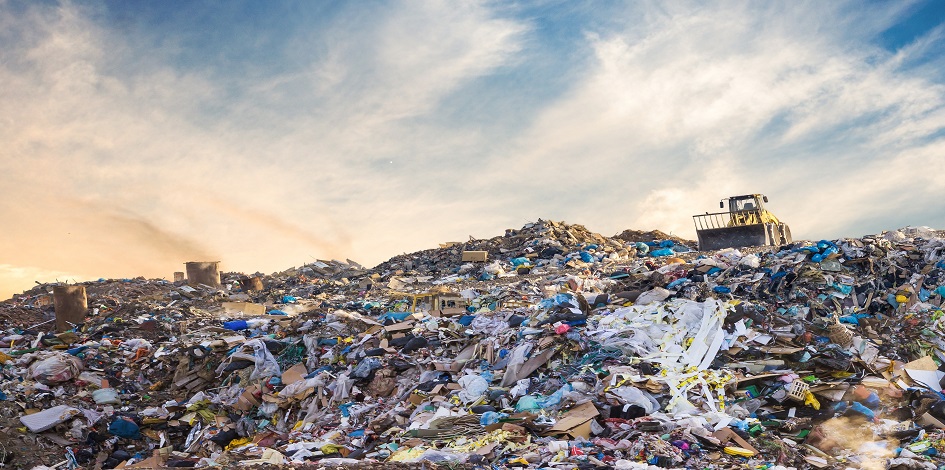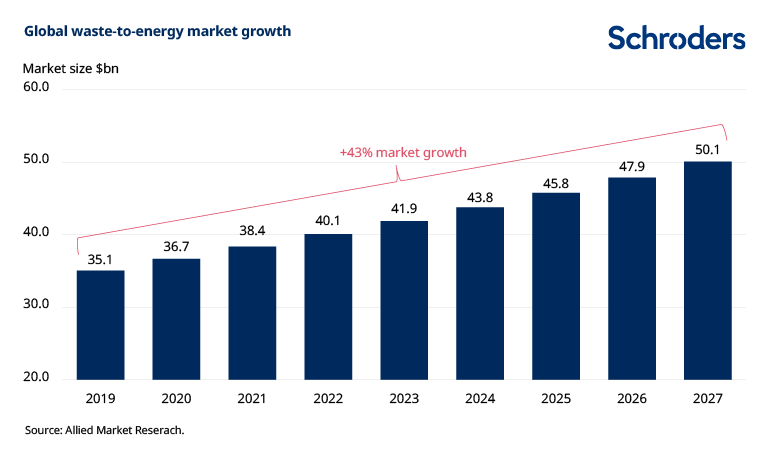Schroders - Why should investors care about waste management?
Waste management has long been one of society’s primary challenges. It’s an industry that’s ripe for disruption given how little it’s changed over the last few centuries.

Why is waste a problem?
Poor waste management contributes to climate change, directly affects ecosystems and generates air, water and land pollution.
For example, landfills alone – in which 37% of global municipal solid waste (MSW) is disposed - account for 8-10% of human activity-based methane emissions.
Food waste is a pressing issue – its economic cost is estimated to be $1 trillion a year, according to the Food and Agriculture Organisation of the United Nations. It can lead to greater water scarcity, loss of biodiversity, adverse health effects and soil erosion – which in itself can lead to increased risk of conflict and loss of livelihoods.
Is waste creation being regulated?
Social and political pressure for waste creators to handle waste in more sustainable ways is intensifying. As a result, the regulatory burden is ratcheting up.
There appears to be unanimity among regulators to enforce a “polluter pays” principle. This could include increased taxes on waste imports/exports, rising landfill gate prices and increasingly punitive fines for the mismanagement of waste and illegal dumping.
Furthermore, regulators are looking to incentivise countries to dispose of the waste they create domestically rather than exporting it to other countries - a common practice given the strong international trading market for waste.
These shifts in the regulatory landscape create a growing need for society to develop new and innovative ways in which to handle waste in socially- and environmentally-friendly ways.
As such, there is an increasing opportunity for companies with new technologies to enable this.
What is the opportunity for investors?
Given the rapid, expected rise in MSW generation over the coming decades, there are three areas we believe are particularly interesting:
- AI and automated sorting
It’s estimated that over half of all waste management tasks in material recovery facilities can be automated. Using computer vision, 3D laser scans and metal sensors, combined with machine learning and advanced robotics, the accuracy and sensitivity of automated sorting can be dramatically improved.
- Waste-to-energy
This is a method by which electricity or heat is generated from the processing and treatment of waste. It cuts demand for landfill and dumping sites, lowers dependence on fossil fuels and in some instances, reduces environmental pollution.
It’s expected to be the fastest-growing waste management sector over the next five years.

- Landfill methane capture
Landfills account for 11% of global methane emissions – this is the gas that is generated as organic matter decomposes. It has higher global warming potential than carbon dioxide.
But the gas can be captured and used as a clean fuel source, preventing landfill gas emissions and displacing the use of fossil fuel alternatives.
One million tonnes of MSW can capture enough methane to power about 1,850 European homes for a year.
While other methods of transforming waste to energy have higher energy conversion efficiency, where landfills already exist, the environmental impact of capturing the methane that would otherwise enter the atmosphere is clearly positive.
Society’s waste problem is here to stay
Underpinned by strong social megatrends and increasingly stringent regulations, the need to manage waste in an energy-efficient, socially- and environmentally-friendly way, is increasing.
In an industry that has remained broadly unchanged for centuries, we believe this presents a significant opportunity for new emerging technologies to become market leaders in this rapidly growing market segment while also tackling one of mankind’s biggest social and environmental challenges.
Important Information
This communication is marketing material. The views and opinions contained herein are those of the author(s) on this page, and may not necessarily represent views expressed or reflected in other Schroders communications, strategies or funds. This material is intended to be for information purposes only and is not intended as promotional material in any respect. The material is not intended as an offer or solicitation for the purchase or sale of any financial instrument. It is not intended to provide and should not be relied on for accounting, legal or tax advice, or investment recommendations. Reliance should not be placed on the views and information in this document when taking individual investment and/or strategic decisions. Past performance is not a reliable indicator of future results. The value of an investment can go down as well as up and is not guaranteed. All investments involve risks including the risk of possible loss of principal. Information herein is believed to be reliable but Schroders does not warrant its completeness or accuracy. Some information quoted was obtained from external sources we consider to be reliable. No responsibility can be accepted for errors of fact obtained from third parties.

